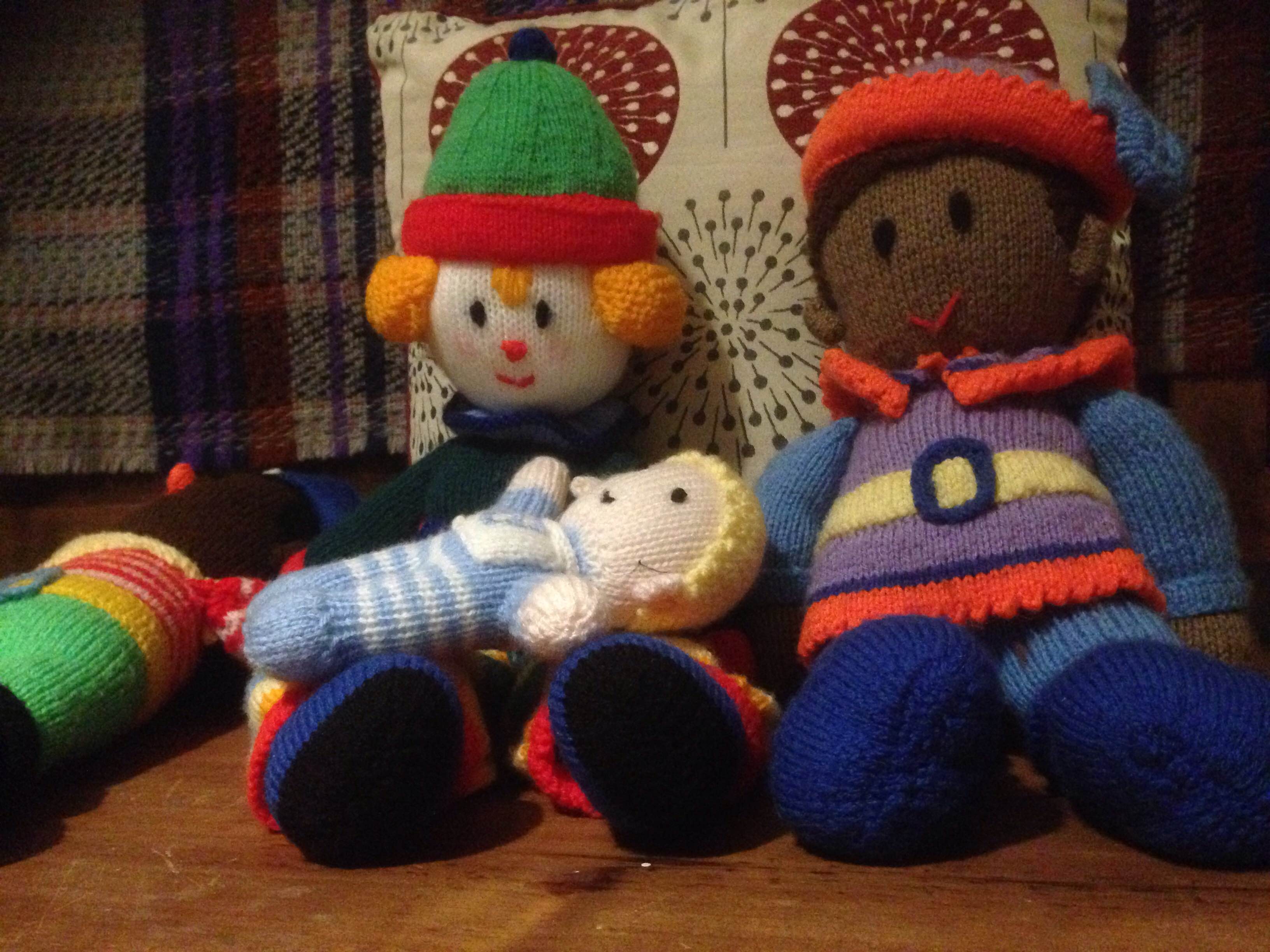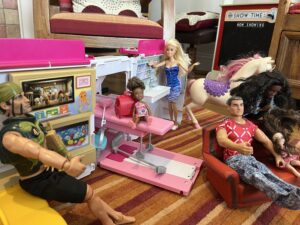When talking to your child about coming to therapy it’s going to be helpful to use words they understand, and be clear that this is a space for them to use however they like, it’s not because they’ve done something wrong or need to be “fixed”. You might use the word “counselling” if this is something they have heard of, or say something like “someone who can help with your worries”. Make sure they know that they will come once to meet me and then it’s completely up to them if they want to come back or not after that…
Under Fives
The ver y youngest children may not realise they are coming to therapy at all. From their point of view they are coming to a room with lots of toys, a sand tray, puppet theatre and so on where they can play freely. Most under fives attend with parent(s) and my attention is split between both what the parent(s) tell me about the child’s feelings and behaviours, and also close observation of how the child responds in the room, how they express their feelings and how they interact with others . The young child’s behaviour is their way of communicating their feelings, so very close attention is paid to what they do in the room and to parents’ / carers’ reports of their child’s behaviour at other times. By understanding the meaning of the child’s behaviour it can be possible for parents to start to put feelings into words for children, and for verbal children to start being able to do this for themselves rather than have to act this out through behaviour such as tantrums, refusal to engage in activities or refusal to eat certain foods (etc.).
y youngest children may not realise they are coming to therapy at all. From their point of view they are coming to a room with lots of toys, a sand tray, puppet theatre and so on where they can play freely. Most under fives attend with parent(s) and my attention is split between both what the parent(s) tell me about the child’s feelings and behaviours, and also close observation of how the child responds in the room, how they express their feelings and how they interact with others . The young child’s behaviour is their way of communicating their feelings, so very close attention is paid to what they do in the room and to parents’ / carers’ reports of their child’s behaviour at other times. By understanding the meaning of the child’s behaviour it can be possible for parents to start to put feelings into words for children, and for verbal children to start being able to do this for themselves rather than have to act this out through behaviour such as tantrums, refusal to engage in activities or refusal to eat certain foods (etc.).
Five to eleven
Most children in this age group will use a mix of play and talk to communicate their feelings. The therapist’s job is to pay very close attention to this communication and to help bring into focus thoughts and feelings which might feel to hard to say, or might be unconscious, but which are causing the child difficulty. For example, a child might play out a situation a bit like their own situation using dolls house figures, puppets or dinosaurs, and the therapist will verbalise something about the emotions and feelings which are being expressed in the play. Children may also talk about things that are worrying or bothering them or which make them angry, and (as with older adolescents or adults) the therapist’s job is to look for patterns and draw out aspects of this which might not be fully conscious, in order to help the child be able to think about this more clearly and to find a language to explore it. Often the things that are bothering children are very hard to put into words, otherwise they would not be coming for therapy – and one aim of therapy is to find a language so that these things can be spoken about and become less troubling.
therapist’s job is to pay very close attention to this communication and to help bring into focus thoughts and feelings which might feel to hard to say, or might be unconscious, but which are causing the child difficulty. For example, a child might play out a situation a bit like their own situation using dolls house figures, puppets or dinosaurs, and the therapist will verbalise something about the emotions and feelings which are being expressed in the play. Children may also talk about things that are worrying or bothering them or which make them angry, and (as with older adolescents or adults) the therapist’s job is to look for patterns and draw out aspects of this which might not be fully conscious, in order to help the child be able to think about this more clearly and to find a language to explore it. Often the things that are bothering children are very hard to put into words, otherwise they would not be coming for therapy – and one aim of therapy is to find a language so that these things can be spoken about and become less troubling.
 Parents of under 12s may often want “strategies” to help with their child’s behaviour. Psychotherapy is not primarily about strategies for behaviour, it is about finding out what the problem is so that the child does not have to communicate through behaviours which might be challenging, dangerous or concerning to parents. However, alongside this it is also possible to think with parents about how best to support your child or understand their behaviour, which may include some ideas around different parenting approaches. For example, a child who is struggling to sleep may be doing so because of worries, and I would therefore be thinking with parent(s) about practical ways to help this child offload their worries before bedtime, or to feel less scared at night. A child who is controlling one aspect of their life (such as food) may be helped when parents can reflect on which other areas of the child’s life might feel to them particularly scary or out of control and can help the child to manage these areas, thereby lessening the child’s need to try to control their life through food; at the same time, some practical approaches to helping the child experiment with a wider range of foods might be tried.
Parents of under 12s may often want “strategies” to help with their child’s behaviour. Psychotherapy is not primarily about strategies for behaviour, it is about finding out what the problem is so that the child does not have to communicate through behaviours which might be challenging, dangerous or concerning to parents. However, alongside this it is also possible to think with parents about how best to support your child or understand their behaviour, which may include some ideas around different parenting approaches. For example, a child who is struggling to sleep may be doing so because of worries, and I would therefore be thinking with parent(s) about practical ways to help this child offload their worries before bedtime, or to feel less scared at night. A child who is controlling one aspect of their life (such as food) may be helped when parents can reflect on which other areas of the child’s life might feel to them particularly scary or out of control and can help the child to manage these areas, thereby lessening the child’s need to try to control their life through food; at the same time, some practical approaches to helping the child experiment with a wider range of foods might be tried.
Most children in this age group will largely communicate through talk, though they might also make use of some drawing materials or fidget gadgets (e.g. rubix cube, magnets, fidget cube). Many young people of this age might feel have more ideas (both correct and incorrect) about what to expect in therapy. It’s important that your child knows they are not committing themselves to anything if they come and check therapy out and find out for themselves. They will need to know that their appointments are confidential and that the “agenda” is their own, it’s all about the things that they are finding difficult and that they might want help with – they are not being “sent” to therapy because someone wants them “fixed”, or because their behaviour isn’t good enough or because they are “mad”. They might find it useful to follow up some of the links from this website for themselves before making a decision, or to do their own research about types of therapy.
